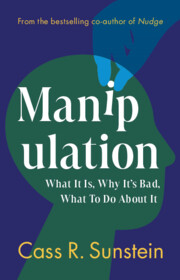3 - The Right Not To Be Manipulated
from Part I - Theory
Published online by Cambridge University Press: 28 August 2025
Summary
It is time to recognize a moral right not to be manipulayed. At the same time, the creation of a legal right not to be manipulated raises hard questions, in part because of definitional challenges; there is a serious risk of vagueness and a serious risk of overbreadth. It is probably best to start by prohibiting particular practices – the most egregious forms of manipulators. The basic goal should be to build on the claim that in certain cases, manipulation is a form of theft; the law should forbid theft, whether it occurs through force, lies, or manipulation. Some manipulators are thieves. Examples include hidden terms and automatic enrollment in programs that take people’s money and time.
Information
- Type
- Chapter
- Information
- ManipulationWhat It Is, Why It's Bad, What to Do About It, pp. 50 - 68Publisher: Cambridge University PressPrint publication year: 2025
